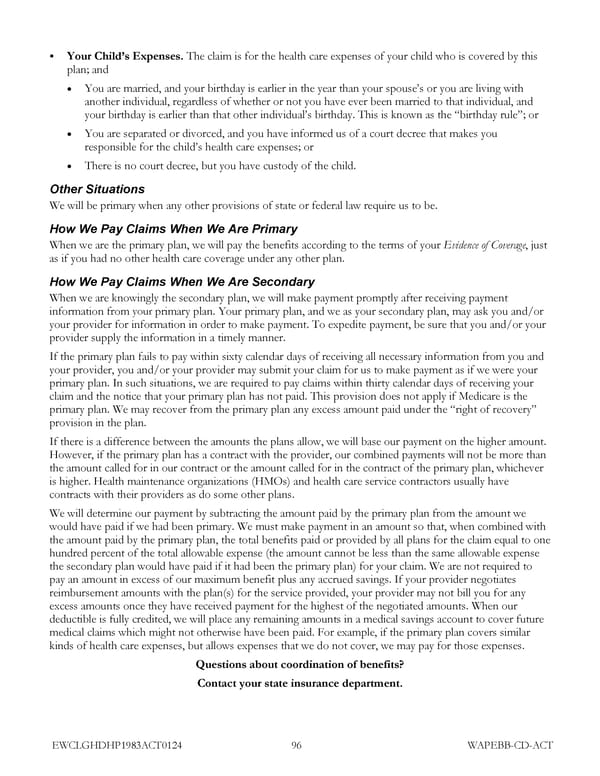Your Child’s Expenses. The claim is for the health care expenses of your child who is covered by this plan; and • You are married, and your birthday is earlier in the year than your spouse’s or you are living with another individual, regardless of whether or not you have ever been married to that individual, and your birthday is earlier than that other individual’s birthday. This is known as the “birthday rule”; or • You are separated or divorced, and you have informed us of a court decree that makes you responsible for the child’s health care expenses; or • There is no court decree, but you have custody of the child. Other Situations We will be primary when any other provisions of state or federal law require us to be. How We Pay Claims When We Are Primary When we are the primary plan, we will pay the benefits according to the terms of your Evidence of Coverage, just as if you had no other health care coverage under any other plan. How We Pay Claims When We Are Secondary When we are knowingly the secondary plan, we will make payment promptly after receiving payment your information from primary plan. Your primary plan, and we as your secondary plan, may ask you and/or your provider for information in order to make payment. To expedite payment, be sure that you and/or your provider supply the information in a timely manner. If the primary plan fails to pay within sixty calendar days of receiving all necessary information from you and your provider, you and/or your provider may submit your claim for us to make payment as if we were your primary plan. In such situations, we are required to pay claims within thirty calendar days of receiving your claim and the notice that your primary plan has not paid. This provision does not apply if Medicare is the y primary plan. We may recover from the primary plan any excess amount paid under the “right of recover ” provision in the plan. If there is a difference between the amounts the plans allow, we will base our payment on the higher amount. However, if the primary plan has a contract with the provider, our combined payments will not be more than the amount called for in our contract or the amount called for in the contract of the primary plan, whichever is higher. Health maintenance organizations (HMOs) and health care service contractors usually have contracts with their providers as do some other plans. We will determine our payment by subtracting the amount paid by the primary plan from the amount we would have paid if we had been primary. We must make payment in an amount so that, when combined with the amount paid by the primary plan, the total benefits paid or provided by all plans for the claim equal to one hundred percent of the total allowable expense (the amount cannot be less than the same allowable expense the secondary plan would have paid if it had been the primary plan) for your claim. We are not required to pay an amount in excess of our maximum benefit plus any accrued savings. If your provider negotiates reimbursement amounts with the plan(s) for the service provided, your provider may not bill you for any excess amounts once they have received payment for the highest of the negotiated amounts. When our deductible is fully credited, we will place any remaining amounts in a medical savings account to cover future medical claims which might not otherwise have been paid. For example, if the primary plan covers similar kinds of health care expenses, but allows expenses that we do not cover, we may pay for those expenses. Questions about coordination of benefits? Contact your state insurance department. EWCLGHDHP1983ACT0124 96 WAPEBB-CD-ACT
 Kaiser Permanente NW CDHP EOC (2024) Page 102 Page 104
Kaiser Permanente NW CDHP EOC (2024) Page 102 Page 104